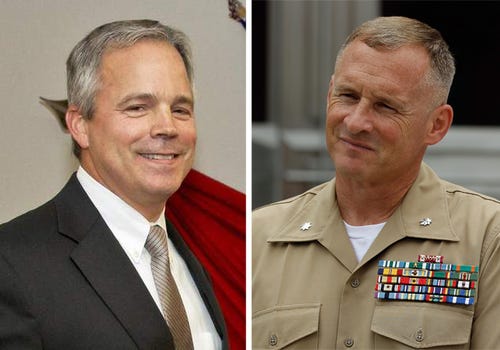source GAIA package: Sx_MilitaryTimes_M6201410302230016_5675.zip Origin key: Sx_MilitaryTimes_M6201410302230016 imported at Fri Jan 8 18:18:15 2016
 The initiative to ban or bury the independent newspaper Marine Corps Times originated in May "on a rather tight timeline" at the behest of Gen. Jim Amos, the service's commandant, newly obtained emails show. The exchange occurred just days before Marine Corps Times published an investigative report spotlighting allegations Amos abused his authority.
The initiative to ban or bury the independent newspaper Marine Corps Times originated in May "on a rather tight timeline" at the behest of Gen. Jim Amos, the service's commandant, newly obtained emails show. The exchange occurred just days before Marine Corps Times published an investigative report spotlighting allegations Amos abused his authority.
Marine Corps Times authenticated the internal discussion from May 15, 2013, that contradicts official statements offered recently in response to the service's abrupt and questionable decision in December to relocate the newspaper away from checkout lines at Marine Corps Exchange stores worldwide. Officials have described the move as an effort to "professionalize" checkout counters, refuting the suggestion it was retaliation for the newspaper's ongoing coverage of allegations surrounding Amos.
On Feb. 12, amid growing criticism from Marines and other media outlets, officials ordered the newspaper returned to store fronts, saying there was a "clear misunderstanding of intent."
The email's subject line reads "CMC OPTIONS," which stands for commandant of the Marine Corps. It originated with Col. Chris Hughes, deputy director of Marine Corps public affairs at the Pentagon, and is addressed to two senior executive service employees, Sheryl Murray, the assistant deputy commandant for Manpower and Reserve Affairs, and Robert Hogue, the commandant's top civilian attorney. Brig. Gen. Paul Kennedy, then the public affairs director, is copied on the message.
Hughes wrote the following:
"We are working a rather tight timeline to respond to CMC on an item. Every couple of years, we have a falling out with Marine Corps Times that warrants consideration of some level of 'ban' from our facilities. We believe that we may be close to such an impasse, and we want to present the Commandant with options. We believe it becomes a 'good order and discipline' issue if CMC believes he is being misrepresented by them. On such grounds, could he prohibit their sale in our [Marine Corps Community Services] facilities? Or, could he place them somewhere less prominent?"
In a followup exchange about three hours later, Hogue told Hughes, "I recommend we try to talk the boss off the ledge here. That said, to respond to your specific question, there are authorities we can use to move the MCT from a position of prominence in our facilities."
Maj. John Caldwell, the media branch head at Marine Corps public affairs, issued a brief statement in response to questions from Marine Corps Times. It says: "The matter at hand remains under review; therefore, we cannot respond in detail at this time." Asked who is conducting the review, Caldwell said: "Appropriate leadership within the headquarters are reviewing the matter. Formal next steps are to be determined."
Neither Hughes, Kennedy, Hogue nor a spokesman for the commandant's office addressed inquirees sent to them.
The "impasse" to which Hughes refers appears to be a Marine Corps Times report published online May 19, four days after his email to Murray and Hogue. Titled "Marine Corps commandant, legal staff targeted in IG complaint," the report details a Marine whistle-blower's allegations Amos, Hogue and three additional legal advisers for the commandant manipulated the military justice system to ensure Marines were punished for making an inappropriate video in Afghanistan.
Murray, whose boss is Lt. Gen. Robert Milstead, deputy commandant for Manpower and Reserve Affairs, answered Hughes' inquiry within 30 minutes. Her reply was brief and direct: "Chris," it reads, "I just discussed this with Gen. Milstead, and he says, 'this is the dumbest idea he has ever heard, and he will not entertain it.' I've advised our M&RA team to cease any review of below."
Milstead's command has responsibility for the exchange stores and commissaries on Marine Corps installations. The order to move Marine Corps Times came quietly in December despite Milstead's apparent unwillingness to entertain Hughes' inquiry.
Marine Corps Times, in a story published online Feb. 9, questioned its abrupt relocation out of concern the move was a form of censorship. That followed several weeks of getting only partial, and inconsistent, answers on why the move was made without notice.
Three days later, Gen. John Paxton Jr., assistant commandant of the Marine Corps, said in a statement announcing the paper was being returned to its previous location that there had been "a clear misunderstanding of intent," that the move was part of a broader plan to revolutionize the front of exchange stores by showcasing "professional military literature and healthy food and beverage choices."
When asked who gave the order to move Marine Corps Times, the service placed responsibility on Milstead, repeatedly saying he "directed" the change. However, no one would address who made the decision Milstead carried out.
In an interview Feb. 14, Hughes dismissed the notion that the decision was tied to Marine Corps Times' sometimes critical coverage of Amos and senior leaders. "Suffice it to say, the movement of Marine Corps Times was premature to any completed study or analysis," Hughes said. "And the commandant recognized that immediately and said 'let's get these guys back up front, where they were,' but he still expects a thorough analysis that, quite frankly, could find you located somewhere else."
Congressman Walter Jones, a North Carolina Republican, has called for a congressional oversight hearing on the initial decision. In a letter to House Armed Services Military Personnel Subcommittee Chairman Joe Wilson, R-S.C., and Ranking Member Susan Davis, D-Calif., Jones expressed concern that the decision was made as a "blatant attempt to punish the Marine Corps Times for their articles investigating the questionable actions of the commandant."




